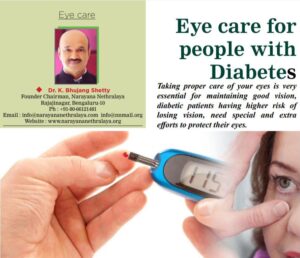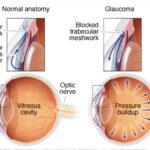Eye care for people with Diabetes is very essential for maintaining good vision. Diabetic patients have an increased risk of developing eye complications which, if left untreated, can lead to poor eyesight and blindness.


Most people are not aware of the fact that high blood glucose levels is one of the most common reasons for vision loss among adults in the whole world. Diabetic patients have an increased risk of developing eye complications which, if left untreated, can lead to poor eyesight and blindness. However, with frequent monitoring of blood glucose levels and with regular eye examinations and early treatment, it is possible to prevent 98% of serious vision loss due to diabetes.
How can diabetes affect the eyes?
High blood glucose levels can cause changes in the shape of the lens which can temporarily cause blurring of your vision. This commonly occurs before being diagnosed with diabetes or when diabetes is out of control. When blood glucose levels are reduced through appropriate treatment, the blurriness usually disappears. Therefore getting new glasses should be delayed until blood glucose levels are under better control.
The blood vessels of the retina may swell and leak fluid leading to changes in the retinal layers and causing visual blurriness. This condition is known as diabetic retinopathy and is commonly found among Type I and Type II diabetic patients. Persistently high blood glucose levels can increase the risk of more serious eye problems in people with diabetes, including:
- Retinopathy
- Cataracts
- Macular degeneration
- Glaucoma
Caring for your Eyes
1. Have a through eye examination by an expert eye care professional when you are first diagnosed with diabetes.
2. Only an expert eye specialist can conduct through examination of your eyes by dilating your eyes, to have a clear picture of your retina.
3. If retinopathy is detected, you will need to have your eyes examined more often.
4. Notify your eye care professional immediately if you notice any changes in your vision.
5. Keep your blood glucose levels, HbA 1 c, blood pressure and cholesterol at recommended levels. High blood glucose, cholesterol and blood pressure increase the risk of eye damage and affect its severity.
6. Have regular health checks including blood pressure readings, cholesterol measurements and kidney function tests as recommended by your health care team.
7. Quit the habit of smoking as soon as possible.
Also read: Smoking cessation at any stage has great health benefits
8. Maintain a lifestyle that includes regular physical activity and healthy eating to better manage your blood glucose levels.
9. Always take your medications as instructed by your doctor.


Dr. Bhujang Shetty – Chairman
Narayana Nethralaya
121/C , 1st ‘R’ Block, Chord Road
Rajaji Nagar
Bangalore – 560010
Ph: o8o-6612 1401-1402











